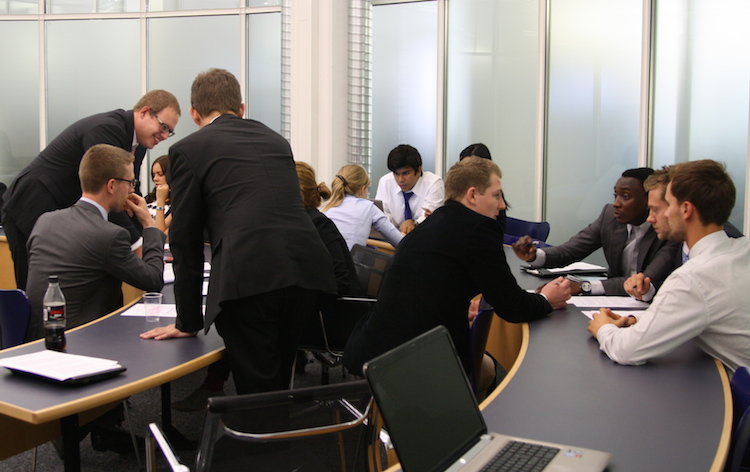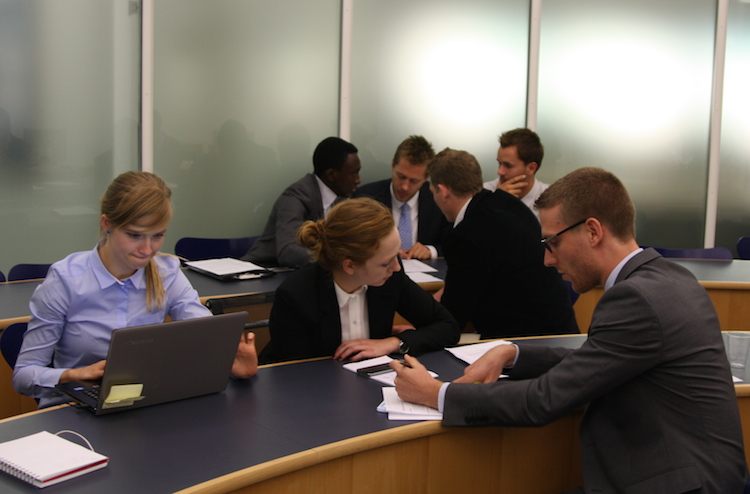
Picture taken during the Global Negotiation Conference 2015 © Jack Williams
We are all constantly negotiating, whether when discussing with friends which restaurant to eat at or when we request extra holiday for working weekends. Negotiation is a way to solve disagreements without having to resort to hitting someone over the head. Even though we regularly take part in bargaining and haggling, the practical study of negotiation is a more specialised discipline. In academia it is often confined to the syllabuses of business and law schools even though for every profession and person the ability to handle conflict is essential. Negotiation is especially important in the world of international diplomacy where failure to reach an agreement can be devastating.
The Global Negotiation Conference was founded to encourage all students, no matter their academic background, to study the practical skills of negotiation in an international context. Since the conference was established participants have included students of economics, history, philosophy, political science as well as the natural sciences. At a time when interdisciplinary collaboration is in vogue, we have witnessed first-hand the positive learning effects of bringing together students with different methodological skills and ways at tackling problems.
A creative atmosphere helps the GNC to fulfil its primary aim of providing a stimulating learning experience for the participants. The conference begins with two days of workshops and presentations, each focusing on a specific area of negotiation. The topics are selected to be accessible and interesting to those with varying experience of negotiation. We always try to select some topics that would be unlikely to feature in a standard university syllabus. In the first year Mikkel Gudsøe from the University of Aarhus, gave a presentation on email negotiations showcasing tips that I have since employed when faced with tricky electronic correspondence. Mikkel will be returning this year to give a master class in body language teaching students how to pay attention to non-verbal signals we often ignore. Like our participants the speakers come from a variety of different backgrounds, all with their own approaches. Rudolf Schüssler, Professor of Philosophy and Economics at the University of Bayreuth, will be presenting this year on the necessity to consider fairness and justice when crafting negotiation agreements. The interactive nature of the workshops gets the participants working together right from the start. This means that they all know each other well by the time they don their business attire for the multiparty simulation on the last day of the conference.
The multiparty simulation that marks the climax of the GNC is an intense affair. Students begin blurry eyed at nine o’clock in the morning and negotiate all day without any specified coffee, snack or lunch breaks. The negotiation involves all of the students in attendance separated into teams. Participants register for the conference as a team of two and three and are assigned a role for the simulation once their registration is confirmed. Confidential instructions and background readings are sent to the teams to help them to prepare. The format of the simulation aims to encourage the teams to solve the problem or conclude an agreement rather than to ‘win’ or ‘beat’ the others. For every simulation an agreement can only be reached with the consensus of all the teams involved so there is no option but to work together.
The topics that are chosen for each simulation are current international issues that are yet to be solved by the professionals. This brings to the simulation a sense of urgency and relevance which adds to the learning experience. Dealing with a real world problem also illustrates to the participants the challenges that diplomats face every day when trying to get an agreement. The simulations featured in the previous years focused on climate change and how to deal with pandemics following the outbreak of Ebola. This year the GNC will focus on the humanitarian crisis of refugees resulting from horrific conflicts in the Middle East and North Africa. The situations are complex and could easily go on for days or even weeks, as happens in real-life, however we are constrained by time so after eight hours a final motion is voted on and an agreement is passed or rejected.
At the end of each day we also have a full social program. We take this very seriously and know that a good conference isn’t just about the learning experience. One of the staples of the program, and to my knowledge unique to the GNC, is the annual PowerPoint Karaoke. Despite the name there is thankfully no singing involved rather participants are encouraged to stand at the front of the lecture theatre and present a PowerPoint presentation they’ve never seen before. It could be in any language and on any topic. Accompanied by beer and pizza the event has proved to be a hit and has the welcome side effect of being a useful learning tool for improving presentation skills.
The Global Negotiation Conference will take place from the 29th June to the 1st July at the University of Bern, Switzerland. Teams of two or three students can apply to take part in the conference. More information can be found on the webpage: www.negotiationconference.org.





ICAN2016 provides States with a central meeting place to conduct multiple bilateral (regional or plurilateral) air services negotiations or consultations.